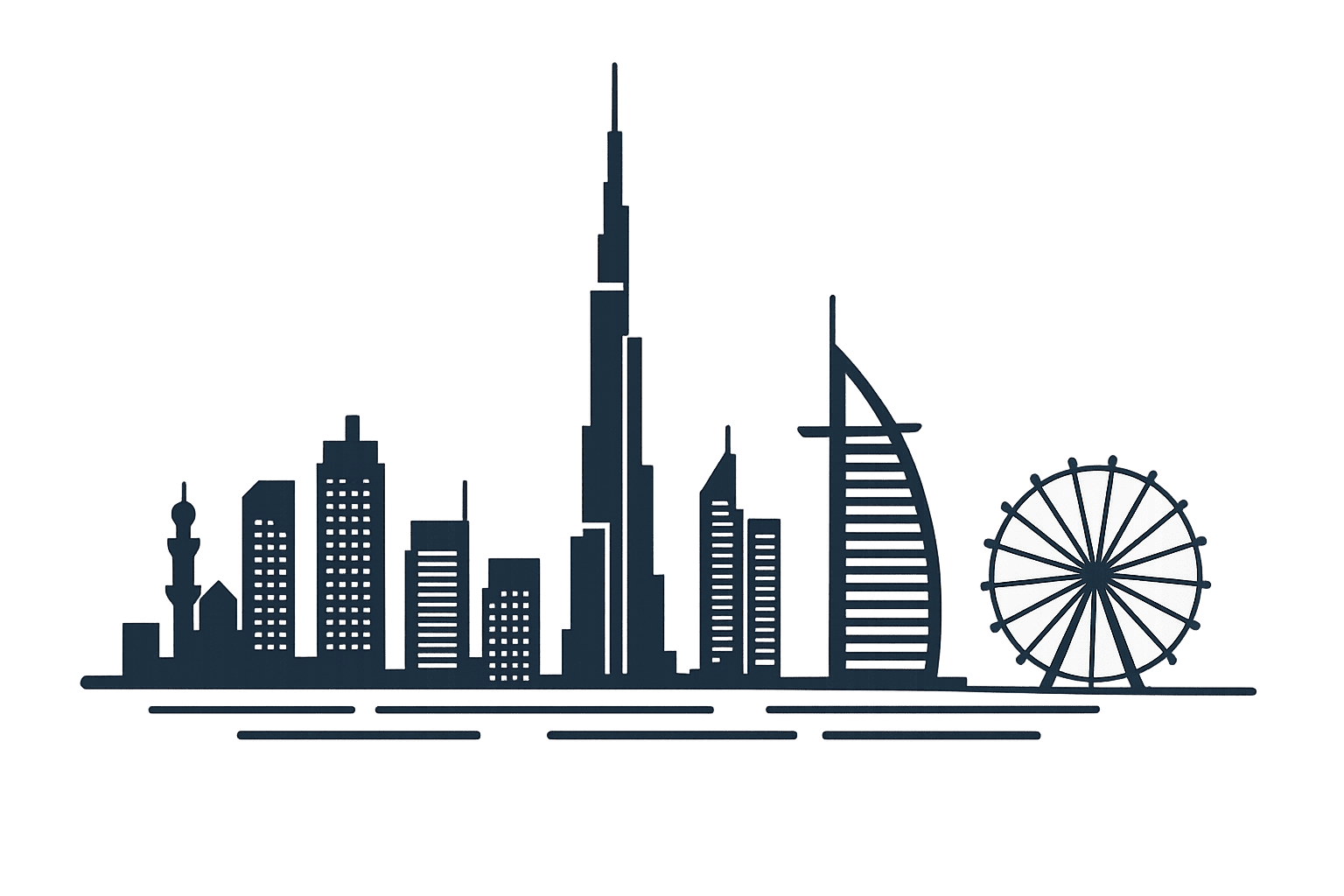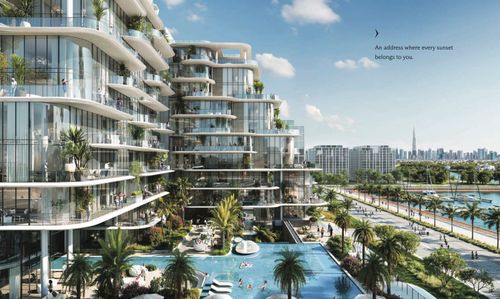
Dubai Off-Plan Properties
All Off-Plan projects and property developers
Latest new development projects
Discover latest off plan projects in Dubai and find your ideal property.
DAMAC Islands 2 is a residential project in Dubai that continues the DAMAC Islands community. The project features homes inspired by eight different islands
Elevia Residences in International City Phase 2, Dubai offers studios and 1-2 BR apartments with pool, gym and 50-50 payment plan, Q1 2027 handover.
Weybridge Gardens 5 offers uninterrupted views across Dubai land, framed by petal-inspired architecture that reflects British design excellence. Crafted by LUD Studios, the residence blends natural forms with contemporary elegance. From the infini...
HADLEY HEIGHTS 2 Located in one of Dubai?s most premium and connected communities, Dubai Sports City offers seamless access to both of the city?s airports, E311, Hessa Street, and key destinations like Dubai Marina and Palm Jumeirah, all within a ...
2B+G+5P+34 Retail Offices and Residential Building
DUBAI LAND » 2B + G + 11 + Roof Studio » 1-2 BR » Sizes from 404 – 1339 sq. ft. » Fully furnished units with premium finishes
Project consists of G+2P+8 residential building located in Dubai Investment Park second, Dubai. The building is designed to have a concrete structure and block with internal and external finishes.
The project comprises 198 high-end luxury townhouses and associated amenities, strategically located adjacent to the prestigious Jumeirah Golf Estates (JGE) Community. The primary objective of the development is to seamlessly integrate urban sophisti...
How It Works
Your journey to owning off-plan property. In 4 simple steps.
Browse All Projects
Don't miss out on the best deals. Our database includes all registered projects and property developers in Dubai.
- Brochures
- Floor Plans
- Visualizations
- Prices
- All Dubai projects
- All property developers
Research with AI
Get instant and unbiased answers to your questions about properties, pricing, legal procedures, and more through our AI system.
- Avoid pushy real estate agents
- Instant answers
- Unbiased information
- Knows everything about all projects
- Available 24/7
Human Expert
When ready, talk to a human real estate expert for personalized guidance. Or contact the developer directly.
- Always available
- Schedule sales office visits
- Schedule construction site visits
- Schedule Zoom presentations
Buy directly from the developer
We connect you with the property developer to secure the best possible terms.
- No commission. No broker fees.
- Payment plan available
- Secure best terms
RERA Protected
Escrow payments
Why invest in Off-Plan Properties?
Flexible Payment Plans
Pay only 20% down and spread the rest over construction milestones. Leverage your capital efficiently.
Capital Appreciation
Buy at pre-construction prices. Benefit from property value increases during construction.
Escrow Protection
Your payments are secure in RERA-regulated escrow accounts. Funds are released to the developer after the construction milestones are met.
No more missed opportunities. Access best projects early.
Use Lankea to find out about off-plan projects before they are launched or as soon as they are registered with RERA.
- Every RERA-registered project
- All licensed property developers
- Brochures and Visualizations
- Payment plans and prices
- Unit availability
- Floor plans
- Handover dates
- Monitor construction progress
- Complete project documentation

Brokers calling and messaging you nonstop? Use Lankea AI instead. You control the conversation.
Get unbiased property recommendations from our AI assistant. No pressure tactics, no hidden agendas. Just honest insights based on your investment goals.
Lankea AI assistant is free to use and works via WhatsApp.
BUY DIRECT FROM DEVELOPERS
No Commission
Lankea connects you directly with property developers to get the best prices.
Locations and communities
Property types
Browse projects by property type
General Off-Plan Information
- Lower entry price: Off-plan properties are usually priced lower than completed homes, allowing investors to buy at pre-construction rates.
- Flexible payment plans: Developers often offer extended payment schedules, so buyers can pay a 10-20% down payment and the rest in installments linked to construction milestones.
- Capital gains potential: Property values may rise by the time the project is completed, giving early investors a chance to profit from price appreciation.
- Modern features: New developments come with the latest designs, amenities, and sometimes options to customize finishes.
- Tax and rental benefits: Dubai has no annual property tax or capital gains tax on real estate, and rental yields are high in many areas compared to other cities.
- Construction delays: Projects can take longer than expected to complete – regulations allow developers up to a one-year delay in some cases before penalties apply. Buyers should check the SPA for any grace period and penalty clause for delays.
- Market fluctuations: Property values might change during the construction period. A market downturn could reduce the value of your investment by handover.
- Developer reliability: There's a risk a developer might run into financial or quality issues. It's important to research the developer's track record; an unreliable developer could face project modifications or cancellations.
- Liquidity and resale restrictions: It may be harder to resell an off-plan unit before completion. Some developers restrict transfer until a certain percentage is paid, and finding a buyer prior to handover can be challenging if market demand is low.
Buying Process and Requirements
Buying off-plan in Dubai usually involves the following steps:
- Select a project: Research and choose an off-plan development that fits your investment goals (consider location, developer reputation, pricing, etc.).
- Reserve the unit: Pay a booking fee (reservation deposit) to the developer to secure your chosen unit. This is often around 5-10% of the price.
- Sign the Sales and Purchase Agreement (SPA): This contract, signed by both buyer and developer, legally binds the deal and outlines all terms (price, payment schedule, completion date, etc.).
- Follow the payment plan: Pay installments as per the agreed schedule in the SPA. Payments are typically tied to construction milestones (e.g. 20% on 20% completion, and so on).
- Handover and registration: Upon project completion, do a final inspection and take possession (handover) of the property. The developer will then arrange to register the property in your name with the DLD, and you receive the title deed.
- A valid passport copy (for foreign buyers).
- Emirates ID (if you are a resident of the UAE).
- Signed Sales and Purchase Agreement (SPA) for the property.
- Proof of your current address and proof of financial capability (such as bank statements or a mortgage pre-approval letter).
Finances and Costs
Besides the property price, buyers should budget for several upfront costs:
- Dubai Land Department (DLD) fee: A 4% registration fee on the purchase price, payable to register the property in your name.
- Oqood fee: This is an off-plan title registration fee (for issuing the Oqood contract) of around AED 3,000 – 5,250, depending on the project.
- Mortgage registration fee: If you are taking a mortgage, an additional 0.25% of the loan amount is charged by DLD to register the mortgage, plus you'll pay bank processing fees and a valuation fee.
- Service charges: These are annual maintenance fees for the property's upkeep (common areas, facilities) due after handover. They vary by project (charged per square foot) and are an ongoing cost for owners.
- Utility connections: One-time connection fees or deposits for water and electricity. For instance, Dubai Electricity & Water Authority (DEWA) charges a refundable deposit (~AED 2,000 for an apartment, ~AED 4,000 for a villa) when setting up the utilities.
- VAT on fees: There is no VAT on the property price (residential sales are generally tax-free), but some fees like the agency commission or certain admin charges may have 5% VAT applied.
It's also worth noting that if you later sell the property, the standard 4% DLD transfer fee would apply at that time, and if you use an agent, a brokerage commission (often ~2%) would be due then.
Legal Protection and Regulations
The Dubai Land Department (DLD) is the government authority responsible for overseeing all real estate transactions and registrations in Dubai, while RERA (Real Estate Regulatory Agency) is a regulatory arm under DLD focused on the real estate sector's rules and compliance. In the context of off-plan properties:
- DLD: ensures that property transactions are registered, issues title deeds, and sets broad regulations for property ownership. DLD also handles the registration of off-plan sale contracts (Oqood) and collects the applicable fees.
- RERA: oversees and regulates developers and projects. RERA requires developers to register each off-plan project with DLD/RERA and to open an escrow account for it. RERA monitors construction progress, enforces escrow laws, and can penalize or bar developers for non-compliance. RERA also provides a platform for buyers to address grievances – for instance, if there are undue delays or changes, buyers can approach RERA for mediation.
In short, DLD handles the administrative and legal framework (ensuring you get a valid title), and RERA provides ongoing oversight of projects and market practices to protect investors.
Investment Returns and Exit Strategies
Several key factors will affect your ROI when investing in off-plan property:
- Location: Properties in high-demand areas or upcoming developments tend to appreciate more and attract higher rents. For example, an off-plan in a well-located community (city center or waterfront) can yield better returns than a remote area.
- Developer reputation: Projects by reputable, top-tier developers often command higher resale value and buyer confidence. A well-built, iconic project will generally see more demand (and higher prices) than a lesser-known development.
- Market conditions: The overall real estate market and economic climate play a big role. If the market is on an upswing (high demand, growth periods), off-plan investments see higher ROI. Conversely, in a downturn, prices and rents can be softer. Government policies (like visa rules or interest rates) also impact demand.
- Payment plan and financing: A favorable payment plan (such as a long post-handover payment schedule) can attract more future buyers, potentially boosting the resale value. Also, if you leverage a mortgage, the cost of financing will affect your net returns.
Ultimately, doing careful research on where and what you buy – and buying at the right phase of the market – will influence your ROI.
About Lankea.com
Contact us for more information.
Ready to find your next investment?
Schedule a free consultation with our team
Get expert guidance from our off-plan specialists to maximize your returns and find the perfect UAE property investment. Book your free consultation today.


















































